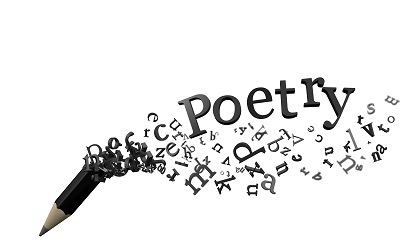Poetry

"I possess no body of work, only the ghostly spirits of one."
Writing poetry isn't harder than writing prose, just different, as different as playing drums rather than playing a lead instrument. Accustomed to the background stage where assonance and alliteration ply their trades, poetry lies hidden within all human speech, rarely center staged. The better prose exhibits poetry's subtle influence and seems to sing or simply hum along behind the story. When poetry moves to the front, some rules of punctuation and propriety step aside like a saxophone section when the percussion solo takes over, for poetry seems first, foremost, and always the juxtapositioning of rhythm to an at least equal presence in the search for meaning within a piece. The beat might even seem to become the melody then. ©2018 by David A. Schmaltz - all rights reserved
The appearance of rhythmically and auditorially similar words at the end of lines seem at first the underlying trick to making a poem meaningful, but the truth lies deeper than this superficially obvious feature. It's true that the sound suddenly matters much more than the denotive meaning when selecting a word, but its very presence and position might well morph the denotive meaning into something more meaningful to its context. Whatever maintains the rhythmic structure might well do, even terms that would utterly undermine any pedestrian piece of prose. The sound either makes sense or not. Meaning almost inexorably follows.
For me, writing poetry involves much more warm-up time than work. A decently anticipated piece usually flows right out the end of my pen or fingertips. The quickly considered ones take forever and a few days to complete, and will likely find themselves abandoned in that vast wasteland between conception and birth. The preparation might well involve a seed of an idea, but will swirl like dandelion fluff in a stiff wind, achingly unable to find a solid bit of soil to root into. A rhythm will emerge to become quite literally the underlying rhythm of my life. I should catch myself syncopating my stride into rough compliance with it, it growing ever finer and definite over time.
I will never gain any certainty that I've crossed any threshold that might constitute time to begin writing. I will finally, usually facing some deadline, simply start somewhere, writing rather haphazardly to fill up the empty beats I will have by then grown to sort of exude as a matter no longer of idle speculation, but of actual fact. The structure almost doesn't matter, for I'm satisfying patter first. The words hardly matter then, either, any old filler will do. I will read through whatever I produce so many times, vocalizing every syllable until the fill fully satisfies the intended rhythm. The meanings will make themselves up, no deliberate imagery allowed, only the blessedly inadvertent ones.
Some way through, a sort of physics takes over, and the poem sets about writing itself, whispering encoded cues that hardly need translating to satisfyingly execute. A genuine miracle occurs, one for which I might claim authorship, though authorship in this context should never imply any sort of conscious mastery. Each finished piece stands as a small testament to letting go and letting come, for as author, I serve as little more (or less!) then a medium in its creation: more petri dish than active biome. I more or less hold the door while the words spill out.
I will read the so-called finished piece, learning more about the deeper structure as I review, changing perhaps everything before calling my work complete. My best ones need transcribing after, moving from the originating medium into another, and this transfer tends to improve the overall coherence of the piece. Should I start on my laptop, I finish with a pen and paper. Starting with pen and paper benefits from a laptop finish. Publishing into another form, my blog or to Facebook, also provides a fresh perspective, and additional changes emerge, though these edits can hardly be considered changes, since the piece, no matter how done I felt, would not, could not be properly finished without these by then small improvements.
I wake from the waking dream to find a completed piece before me. The once-foreign rhythm by then fully infused in some deeper part of my repertoire, The Muse will be more likely to remember me producing it than I ever will. She might ask, after a supper with friends, if I might read a piece or two, and I will have to search the archives for the piece she refers to, for it will have moved back toward the back of the stage by then and my foreground will have cluttered up with whatever I just finished or, more likely, whatever I'm contemplating for next. I possess no body of work, only the ghostly spirits of one.


